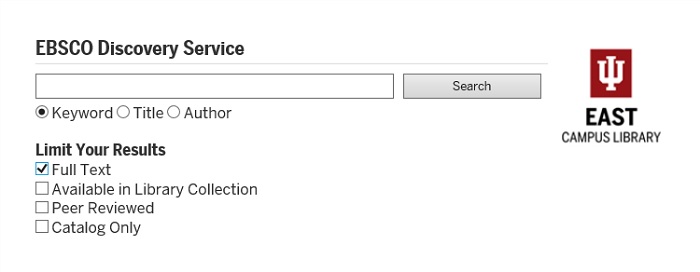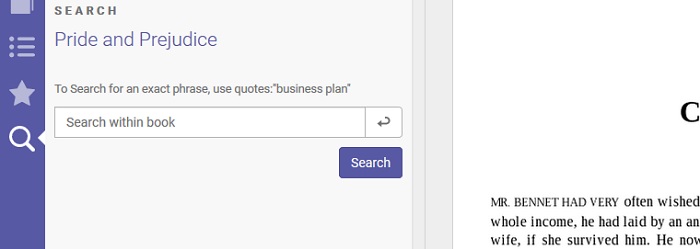A semester can seem like a marathon, but we’re in the final stretch of it now. With final exams upon us, many papers and projects are coming due. Most students have probably completed the majority of their research by this point, and may only need one or two extra articles or books to cite. But even if you haven’t got that far, all hope is not lost.
The first step is to focus on what you know. Pick a topic that you already know a lot about, even if it doesn’t excite you. This will reduce the amount of exploratory time you need to spend getting up to speed, and as you evaluate claims authors make, it will be invaluable to already have a frame of reference for what is and is not true in that field.
Then, as you start researching, focus on electronic resources – articles and ebooks. The EBSCO Discovery Service searches through all of our databases at once, and is a great place to start – there’s an easy search box for it on the library’s home page. Just be sure to choose the ‘Full Text’ limit when you do. While it’s possible to get an article back through Interlibrary Loan in a day or two, that is by no means a guarantee, so be sparing in how much you depend on ILL at this point in the semester. We also have plenty of subject specific databases to use if you don’t like searching them all at once. Again, though, pick one that has plenty of full text like Business Source Complete (for business), CINAHL Plus with Full Text (for nursing), or Wiley Online Library (for science), and make sure to choose the ‘Full Text’ limit. But when you find something that looks good, before you launch into reading the full text, take a moment to read the abstract. If you need something specific in your article, like a focus on the criminal justice system in the United States, and the article is otherwise perfect but is about Sweden’s instead, the abstract will reveal that and can help you cut out unhelpful resources without wasting a lot of time reading whole articles.
As for books, it’s best just to look at ebooks. At this point in the semester, I would ignore IUCAT, our book catalog – its big benefit of being able to have books throughout the IU system sent here for you with a click isn’t going to help you right now. Instead, plunge right in to an ebook database directly. Ebook Central is our biggest and best (and most user-friendly), but others like EBSCO eBooks may be useful as well. Then, when you find a title you like, use the ‘search within book’ option to get right to the parts that matter to you. There’s no sense reading more of a lengthy book than you have to when time is of the essence.
Then, see if you have any specific requirements for some sources. Need at least one peer-reviewed source? Many databases, like the aforementioned EBSCO Discovery Service, have an easy check box to limit only to that type of item. Need a primary source? In the sciences, this means an article where the author conducted their own original research. Skim through an article to see if there are headings that say ‘methods’ and ‘results’ or something similar. If they’re describing how they did their study, you’ve found the resource you need. If not, discard it and keep looking. In the humanities, a primary source is one where the author was personally involved in the actions described – things like a diary, letter, or even an interview. We have databases that specialize in that, such as American Civil War: Letters and Diaries and North American Immigrant Letters & Diaries.
Let’s say you have most of what you need, and just need one or two more sources to meet your project’s requirements. Try looking at the reference page of a great article you already have, and seeing if one of their sources will also work for you. If something on that list looks promising, you can find out if we have the full text for any journal you want here.
The last step is to put together your list of references. Most professors at IU East will ask you to use MLA or APA style for this. The best guide on the internet for doing this is the Online Writing Lab from Purdue University. It covers how to make the reference page, the in-text citations, and also how to do basic paper formatting like setting the spacing, font, running headers, and making title pages. Many databases will let you speed up the process with a ‘cite’ button that creates a pre-generated citation. Just be aware that these are machine generated, and proofread them. The computer can be prone to errors, particularly with capitalization. So compare these to the samples in the Purdue OWL before pasting them into your paper.
And finally, if you run into problems, ask for help right away. Don’t lose precious hours! If the right sources or information aren’t coming up for you, let us help. You can ask us at iueref@iue.edu; and we can connect you with the resources you need to get you to that perfect paper. You’re almost to the finish line – now, let’s complete the race!




